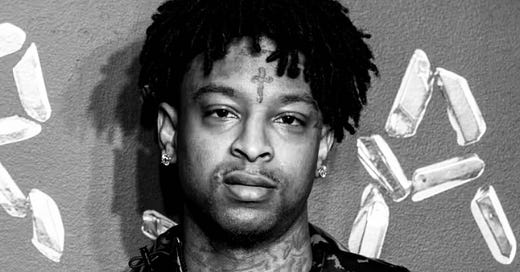The Foundation
If I asked you to describe 21 Savage’s sound the last thing I would expect you to say is “piano based”. I might expect that answer for someone like Adele, but certainly not the grimy and gritty rapper that is 21 Savage.
(twenty one)
And yet, when you look at the data it is the instrument he uses most often (not including bass instruments which are obviously on just about everything everyone does). If you’re new, you can find details about me and this data project here.
Seen below, piano was on half of all the songs he was a part of that appeared in the Hot 100 between 2020 and 2024. It was the first thing that jumped out to me after my custom GPT generated this chart.
(twenty one)
Some Segmentation
The second thing I noticed was that there seemed to be a general prevalence of keyboard based instruments over string based instruments. To be fair, each song does have a unique combination of instruments, but I wanted to probe my general observation with more nuance. So after some discussion with my custom GPT we settled on a calculation that determined whether a song was more keyboard based (including synths, electronic keys, piano and organ) or guitar based (acoustic guitar, electric guitar, etc). This was done by weighing the total instrumentation present in each song.
It is striking. 21 Savage clearly is a very keyboard based artist, in addition to being a very piano based artist. Even more so if you consider that the songs falling into the “Both” category do have keyboards in them as well, albeit not prominent enough to warrant a full “Keyboard-Based” designation. I also find this very compelling when you consider that this consistency is maintained in spite of his frequent collaboration with different artists, which you would think would lead to much more variety in the tracks.
Of course, I was curious to see what the data had to say about how successful each grouping of songs might be when evaluated by their chart performance:
Granted, we are working with limited pools of songs here, so this chart is highly problematic. But if it suggests anything, it might simply be that sticking with keyboard based songs does lead to the most consistent chart performance for 21 Savage. And when he treads beyond those lines the performance is erratic.
(twenty one)
A Bit Of Extrapolation
Maybe that’s why he consistently gravitates to this one kind of production? Perhaps this is an artist who has found their creative-commercial sweet spot; the magical combination of elements that lets them resonate with the audience. If that is the case, I would like to offer an explaination of why it might be so.
In my opinion it starts with the unique, quietly menacing character of his vocal delivery on top of the track. This is the core of 21 Savage’s artistic identity. This is key. But equally important would be a musical foundation that supports this vocal delivery. And the general softness of the piano and other keyboards (at least in general when compared to guitars) might just be the ideal middle layer, with the 808s and hard drums rounding out the base on the bottom. Seems like a powerful formula to me.
Examining this idea a bit further, I looked at the data I gather on how loud/quiet a performer delivers their vocal in each song, and indeed 21 Savage does fall on the quieter side with an overall average intensity of 1.9 out of 3 compared to similar artists who average 2.3. And perhaps more importantly, he often has quieter vocal delivery in his choruses which I would suggest supports the idea that he is intentionally positioning the quiet vocal in the spotlight.
So maybe this indeed is the magical combination of factors that make up 21 Savage’s success afterall: a quiet menacing vocal over hard drums, 808s and supported by a subtler pallet of instrumentation in between, resulting in a powerful juxtaposition the fans seem to love.
(twenty one)
I think that might be enough 21 Savage for now! I’m not sure what I’ll be looking at next week. I might just spark up some conversation with my GPT and see where it takes us.







